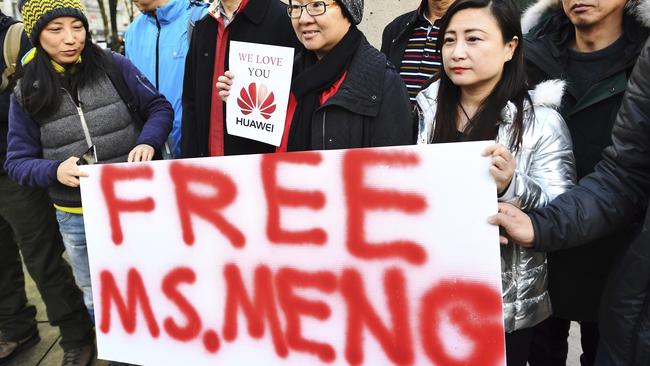Rockier decade lies ahead as superpowers clash
The arrest of 46-year-old Huawei executive Meng Wanzhou should be a wake-up call for Australia.

The arrest of 46-year-old Huawei executive Meng Wanzhou should be a wake-up call for Australia.
The good news is that it now appears China is still intent on pursuing its trade talks with the US despite its anger at both the US and Canada over her detention as she transited through Vancouver airport on December 1.
“We hope both sides can work together to achieve the consensus reached between our two countries’ leaders,” China’s Ministry of Foreign Affairs spokesman Lu Kang said, while criticising Meng’s treatment as “inhumane” given her medical issues.
But Beijing’s fury over the arrest of the daughter of the founder of one of China’s most successful technology companies — and its impact on world markets this week — is a stark reminder that the next decade is set to get a lot rockier as the world’s two economic superpowers continue to clash.
Disputes over technology, trade, spying, global influence including China’s role in the South China Sea and the Pacific will be par for the course in a more uncertain future which markets, investors and decision makers will need to learn to live with.
The angry rhetoric used by the Trump administration to attack China this year is now being matched by Chinese fury over Meng’s arrest — from its media to its normally more carefully worded diplomats.
Watching the heat ratchet up in China in the past few days, it was as if all of Beijing’s frustration at dealing with the attacks from Donald Trump were being funnelled into public anger over Meng’s arrest.
Given the supposed goodwill achieved during the Trump-Xi Jinping dinner in Argentina at the G20 summit, China’s anger at the arrest was understandable.
US questions over the role of Chinese telecoms company ZTE in its trade with Iran were settled this year with a $US1bn-plus fine. Arresting a high level executive of a leading Chinese company is taking US extraterritoriality to a whole new level.
The smooth seas that the Australian economy has enjoyed over the past decade since the global financial crisis thanks to China’s strong economic growth — a period where Australia furiously patted itself on the back for its good economic management — are over.
Former prime minister John Howard acknowledged the importance of the trade relationship in talks in Beijing on Friday when he said our ties with China had allowed Australia to emerge from the GFC “relatively unscathed”.
China will continue to grow and Australia will continue to have China as its major trading partner given the complementarity when it comes to tourism, education, minerals, agriculture, and now food and health products. But the road ahead will be a lot rockier.
As China celebrates 40 years of reform and opening up, it is clear that the next decade will be a lot more challenging as it faces opposition from the West on both trade and security grounds.
World markets overreacted a week ago to the “good news” of the supposed deal between Xi and Trump. There was never a real deal — just an agreement on the US side to postpone proposed tariff hikes on some $US200bn of Chinese imports from 10 per cent to 25 per cent by two months while both sides talked.
But the news coming out since has hit the markets badly — potentially overreacting on the downside as US-China relations enter uncharted territory. The past week has also been a wake-up call for China, which has had to acknowledge that America’s long-term goal is to contain its economic and political rise — a sharp contrast from the official view in the West in the past that China’s growth was largely seen as a good thing for the world economy.
“We still have to continue the trade talks,” Wu Xinbo, director of the centre for American Studies at Fudan University, told the South China Morning Post yesterday. “Meng’s arrest is an individual case. Trade is the bigger issue.”
But he added that China would now be more “clear eyed” about its negotiations with the US and would be putting her case on the table during the upcoming trade negotiations.
Meng’s arrest will see China looking to work harder at its ties with neighbours including Japan and South Korea, and looking to better ties with Europe, particularly with France and Germany.
The China Daily this week talked about the importance of concluding the Regional Comprehensive Economic Partnership between the 10 ASEAN countries and six other countries — Australia, China, Japan, India, South Korean and New Zealand. Less public, but also a consequence of America’s China bashing, and its encouragement of its allies to do likewise, will be closer ties between China and Russia.
World markets will have to live with the fact that Meng’s case could drag on for months. Her legal team is now putting up a fight for her release on bail in Vancouver.
Once she is inevitably transferred to the US, no effort will be spared for her defence. At the same time the US and China will start the gruelling task of trade talks ahead of the March 1 deadline, which will generate more market uncertainty.
No final deal is expected to be reached that will settle the issue once and for all, but some progress will be made, with China expected to announce soon plans to buy more US goods — starting with soy beans.
Meanwhile, in the large cities in China, Christmas decorations abound with fairy lights and tinsel and holly bedecking hotels and shopping malls, despite the fact that China does not celebrate Christmas religiously and bans Communist Party members from having a religion.
For a trade dependent countries like Australia, understanding how socialism with Chinese characteristics continues to unfold will be a challenge for the clear-headed.



